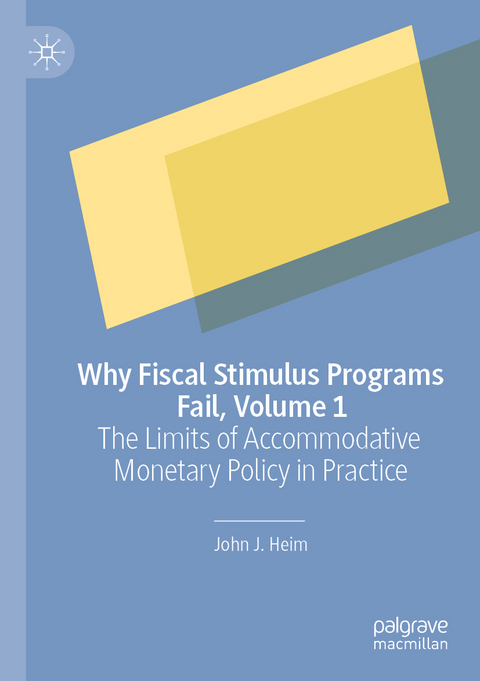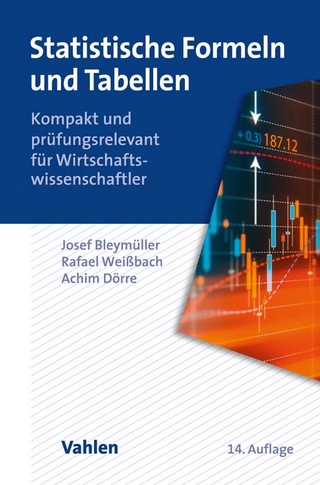
Why Fiscal Stimulus Programs Fail, Volume 1
Springer International Publishing (Verlag)
978-3-030-65677-5 (ISBN)
This book offers a series of statistical tests to determine if the "crowd out" problem, known to hinder the effectiveness of Keynesian economic stimulus programs, can be overcome by monetary programs. It concludes there are programs that can do this, specifically "accommodative monetary policy." They were not used to any great extent prior to the Quantitative Easing program in 2008, causing the failure of many fiscal stimulus programs through no fault of their own. The book includes exhaustive statistical tests to prove this point. There is also a policy analysis section of the book. It examines how effectively the Federal Reserve's anti-crowd out programs have actually worked, to the extent they were undertaken at all. It finds statistical evidence that using commercial and savings banks instead of investment banks when implementing accommodating monetary policy would have markedly improved their effectiveness. This volume, with its companion volume Why Fiscal Stimulus Programs Fail, Volume 2: Statistical Tests Comparing Monetary Policy to Growth, provides 1000 separate statistical tests on the US economy to prove these assertions.
lt;p>
John J. Heim is Visiting Professor at University of Albany-SUNY, and retired Clinical Professor of Economics at Rensselaer Polytechnic Institute, both in New York, USA. He has served in cabinet and subcabinet positions in NY State and Local Government. He is also an inventor of renewable energy devices ("wave energy converters") and holds patents in this area.
Part-1: Introductory Chapter.- chapter 1: Introduction.- Chapter 2: Literature Review.- Chapter 3: Methodology.-Part-2: Theory of crowd out and accommodative monetary policy.- Chapter 4: Theory of Crowd Out and Accommodative Monetary Policy.- chapter 5: A Simplified Balance Sheet View of How Open Market Operations Intended to Stimulate the Economy, When Dominated by Primary Dealers, Actually Stimulate Securities Markets, not the Real Economy.- Chapter 6: A Money Multiplier Approach to How Open Market Operations Stimulate Securities Markets and the Real Economy.- Part-3: The effectiveness of accommodating monetary policy mechanics.- chapter 7: The Role of Primary Dealers in Federal Reserve Efforts to Change the Money Supply.- chapter 8: The Failure of Accommodative Monetary Policy before Quantitative Easing (QE) and Its Success During QE; The "Pushing on a String Problem.- chapter 9:The Failure of U.S. Loanable Funds to Grow as Much as Federal Reserve Securities Purchases During QE: The Role of Foreign Banks.- Part-4: Increases in m1 - effects on stock and bond markets and the GDP.- Chapter 10: Effect of FR Purchases of Government Securities on M1.- Chapter 11: Effect of Increases in Loanable funds or M1 on the GDP.- Chapter 12: Effect of FR Security Purchases and M1 on Stock, Bond and Mortgage Markets.- Part-5: Does crowd out really occur?.- Chapter 13: Does Crowd Out Really Occur? Initial Empirical Evidence - One Time Period.- Chapter 14: Does Crowd Out Really Occur? Empirical Evidence - Replication in Many Time Periods.- Part-6: Increases in total loanable funds (s+fb) - do they reduce crowd out?.- Chapter 15: Initial Tests of Whether Crowd out Effects Can be Offset by Increases in Loanable Funds.- Chapter 16: Which Models Best Explain How Changes in Loanable Funds Offset Crowd Out?.- Chapter 17: Do Loanable Funds Modify the Crowd Out Effects of the One-Variable Deficit (T-G).- Chapter 18: Do Loanable Funds Modify the Crowd Out Effects of the Two-Variable Deficit (T), (G)?.- Chapter 19: Does M1 or Total Loanable Funds Better Measure Offset Effects to Crowd Out?.- Part-7: Determining M1 effects on crowd out.- Chapter 20: Does M1 or Total Loanable Funds More Accurately Define the Extent to Which Crowd Out Can be Modified?.- Part-8: Non-black box models: structural mechanisms through which loanable funds affects consumption and investment.- Chapter 21: Do Consumer Borrowing, Inflation and the Prime Interest Rate Increase When M1, or M2 are increased?.- Chapter 22: Effects on Consumer and Business Borrowing of Loanable Funds and M1.- Chapter 23: Effects on Inflation of Loanable Funds and M1.- Chapter 24: Effects on the Prime Interest Rate in Keynesian Models of Loanable Funds and M1.- Part-9: Summary chapters.- Chapter 25: Summary of Introductory. Literature Review, and Methodology Chapters.- Chapter 26: Summary of Crowd Out and Accommodative Monetary Policy Theory Chapters.- Chapter 27: Summary of the Science Underlying the Conclusion that "Crowd Out" is a Serious Problem and that Accommodative Monetary Policy Can Offset It .- Chapter 28: Summary Of Engineering Equations.- Chapter 29: Acronyms Defined.- Part-10: Overall conclusions.- Chapter 30: Overall Conclusions.
| Erscheinungsdatum | 22.03.2022 |
|---|---|
| Zusatzinfo | XXXIII, 577 p. 34 illus. |
| Verlagsort | Cham |
| Sprache | englisch |
| Maße | 148 x 210 mm |
| Gewicht | 790 g |
| Themenwelt | Wirtschaft ► Volkswirtschaftslehre ► Makroökonomie |
| Wirtschaft ► Volkswirtschaftslehre ► Ökonometrie | |
| Wirtschaft ► Volkswirtschaftslehre ► Wirtschaftspolitik | |
| Schlagworte | 2008 financial crisis • Accomodative Monetary Policy • Crowding Out • Econometrics • Fiscal Stimulus • government spending • Keynes • Macroeconomics • monetary policy • Quantitative Easing • Stimulus Program • US Macroeconomic Policy |
| ISBN-10 | 3-030-65677-2 / 3030656772 |
| ISBN-13 | 978-3-030-65677-5 / 9783030656775 |
| Zustand | Neuware |
| Haben Sie eine Frage zum Produkt? |
aus dem Bereich


